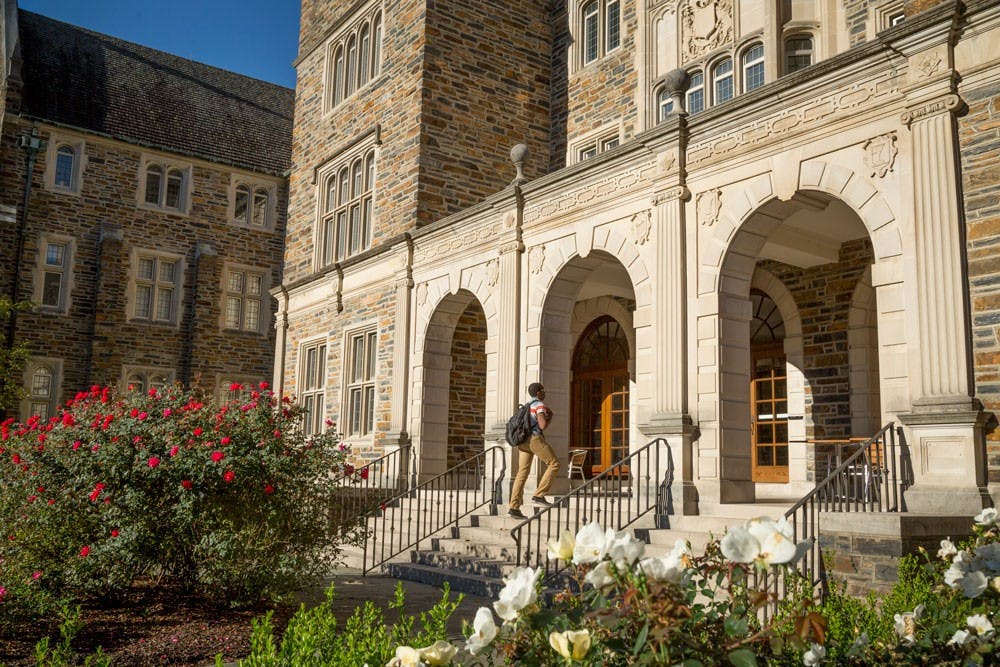The Academic Council heard a presentation from Duke’s two faculty ombudspeople on Thursday during its last meeting of the academic year.
Laura Svetkey, professor of medicine and School of Medicine ombudsperson, and Paul Manos, professor in the department of biology and Duke faculty ombudsperson, discussed their annual reports with the Council. Council members considered these reports in the context of the new ombuds office that the University is in the process of establishing. Both Svetkey and Manos expressed their support for a centralized ombuds office staffed with full-time, professional ombudspeople.
“It's very timely for us to make this presentation as we transition out of what is called ‘collateral ombudsman’ or part-time ombudsman,” Manos said.
Manos urged the University to prioritize the “visibility of the ombuds” when creating the office. But Svetkey added that while most faculty do not see ombudspeople, she considers this a good thing because she believes that means “that either things are going okay or folks have figured out a way to resolve conflicts on their own.”
Manos then clarified that the role of the ombuds is to listen to faculty so that they can ultimately respond to conflicts on their own, he said.
“While the new office will bring about change, the time-honored role of the ombuds is all about supporting faculty in need of a soundboard and a path forward,” Manos said.
Manos described that the kinds of issues he works on with faculty are usually of the “one-off nature,” in that there are “hardly ever any multiple hits of particular issues.” He added that this could be a result of him being a new ombudsperson, with this past year being his first.
One trend that Manos did notice, however, was that the faculty who used his ombuds services to discuss concerns about compensation and advancement tended to be women.
Manos reported to the Council that 29 faculty members utilized his ombuds services, 14 of which were women. Svetsky met with 32 faculty members from the School of Medicine. She reported that the numbers of women and faculty from underrepresented minority groups were proportional to the School of Medicine’s faculty makeup.
Both Manos and Svetsky noticed that the number of faculty who sought ombuds services has sharply decreased from the 2019-2020 academic year. Svetsky reported 58 unique individuals seeing her in the 2019-2020 academic year, but said “last year and this year were comparable.”
“As far as we can tell, things are not getting worse,” Svetsky explained. “And I think that's notable given the cumulative stress and strain on our faculty and of course on all of society over the last two and a half years.”
Manos and Svetsky also pointed out that they both spend a disproportionate amount of their time with those who are currently under investigation by the University, which are mostly men, according to Manos.
Svetsky said that she hopes that the move to a centralized office will cause a shift from a traditional justice approach, which focuses on blame and punishment, to a restorative justice approach, which centers on harm and mitigation of that harm.
Anathea Portier-Young, associate professor of Old Testament in the Divinity School, asked whether Manos and Svetsky had specific recommendations for the new, centralized ombuds office to “ameliorate systemic issues” and focus on a restorative justice approach.
For Manos, addressing such systemic issues comes down to visibility of and communication from the new ombuds office, so that administrators and departmental leadership can look to the ombuds office for guidance.
In other business:
The Council presented the new members of the Executive Committee of the Academic Council, who are elected to serve a two-year term. The new members of ECAC are Karin Reuter-Rice, associate professor in the School of Nursing; Barak Richman, Katherine T. Bartlett professor of law; Deondra Rose, associate professor in the Sanford School of Public Policy; and Mine Çetinkaya-Rundel, professor of the practice of statistical science.
The Council approved the degrees for those candidates who are set to graduate May 8. It also approved the annual reports from the Academic Programs, University Priorities and Global Priorities Committees and the Athletic Council.
Get The Chronicle straight to your inbox
Sign up for our weekly newsletter. Cancel at any time.

Adway S. Wadekar is a Trinity junior and former news editor of The Chronicle's 119th volume.

